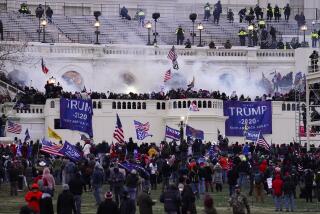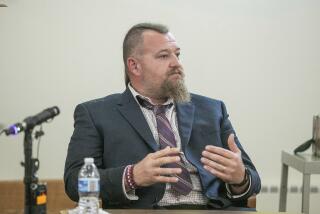Jury acquits 1 terrorism suspect, deadlocks on 6
MIAMI â A federal jury Thursday acquitted one member of a group accused of plotting to blow up Chicagoâs Sears Tower and declared themselves deadlocked in deciding the fate of the six other defendants in the case of the so-called Liberty City Seven.
The case has divided legal experts over how far the government should go in building a case against terrorism suspects. Paid government informants who provided evidence for prosecutors had proposed acts of violence to suspects under surveillance, leading critics to question whether the case was entrapment rather than, as officials said, a preemptive strike against a genuine terrorism plot.
The entire case was âa script written, produced and directed by the government,â Ana Jhones, attorney for alleged ringleader Narseal Batiste, argued before the court in her closing statement two weeks ago.
Batiste, 33, the local spiritual leader of an obscure religious sect known as the Moorish Science Temple, testified during the trial that he agreed to draft terrorism plots with an FBI undercover informant he thought was from Al Qaeda only because he hoped to get $50,000 from the man. The money, Batiste said, was to be used to sustain his religious chapter and start a construction business.
Batiste also told the jurors that the other six defendants -- with whom he worked odd jobs and studied an array of religions, including Christianity, Judaism and Islam -- knew little if anything about his discussions with Elie Assad, the key FBI informant. Assad pretended to be an emissary of Osama bin Laden, whom he called Brother Mohammed.
Prosecutors conceded from the beginning that the defendantsâ group was more âaspirational than operational,â but warned that they were a home-grown terrorist cell conspiring to commit violent acts against Americans.
The federal government charged that the group discussed attacking the Sears Tower and cased federal buildings in the Miami area, including FBI headquarters, with an eye toward additional violence.
U.S. District Judge Joan Lenard, who presided over the trial, refused to lift a gag order on the attorneys involved in the case or to let the acquitted defendant, Lyglenson Lemorin, talk to reporters.
All seven defendants remained in custody, as they have been for the last 18 months, with Lemorin, a legal U.S. resident of Haitian origin, detained on an immigration hold.
Six of the defendants were arrested last year at the Liberty City warehouse where they met and sometimes slept. Lemorin, 32, was picked up in Atlanta, where he had moved from Miami.
Jury foreman Jeff Agron, a 46-year-old attorney, told reporters outside the federal courthouse that the 12 jurors were split evenly in the four votes they took since they began deliberations Dec. 3.
âPeople have different takes on what they saw, on what was said and what was meant,â Agron said, referring to the clandestinely taped videos and intercepted phone calls presented to the jury.
The most controversial piece of evidence involved a video showing Assad conducting a ceremony in which Batisteâs six followers swore an oath of allegiance to Al Qaeda. The ringleader already had pledged himself to the terrorist group in an earlier conversation wiretapped by the government.
The office of U.S. Atty. R. Alexander Acosta announced that a new trial would be sought next month, and Lenard agreed to start seating another jury Jan. 7.
Charges were brought against the men, all of Haitian or Dominican origin, amid last yearâs congressional election battles, leading to accusations that the Bush administration was moving against a hapless band of indigents to demonstrate progress in its declared global war on terrorism.
One critic of the prosecution, retired FBI agent James Wedick Jr. of Gold River, Calif., said the government had overreached in its quest to ward off terrorist threats by using an informant known to be unreliable. Defense lawyers sought to use Wedick as an expert witness, but prosecutors prevailed in preventing his testimony, contending it was irrelevant to the case.
Some legal observers, however, defended the prosecutors, saying they may have felt compelled to act to prevent a potential terrorist attack.
âThe government portrayed the Liberty City Seven as homegrown terrorists, which concerns many in the United States,â said Carl Tobias, a law professor specializing in terrorism issues at the University of Richmond. âThe government may also have intervened too early in the plot to secure the requisite evidence to prove the case.
âThe government has a dilemma in this kind of situation, because if it waits too long, people could be injured or killed.â
--
More to Read
Sign up for Essential California
The most important California stories and recommendations in your inbox every morning.
You may occasionally receive promotional content from the Los Angeles Times.










